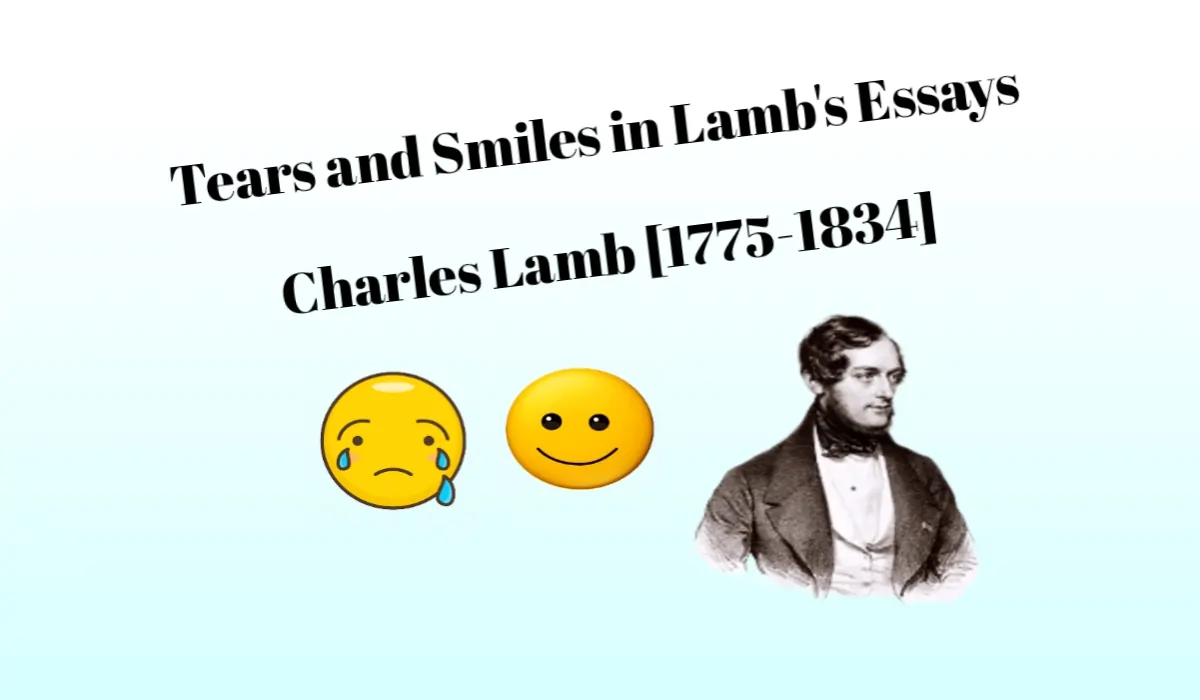Tears and Smiles in Lamb’s Essays
Contents
Introduction
Charles Lamb had a rare talent of mixing tears and smiles in his essays. He essays are deliberately studied deliberation poignant memories and expressions of un-fulfillment desire or thoughts which are very personal in nature or anecdotes which are also personal but not factual.
Most Important Element in Lamb’s Essays
The most important element of Lamb’s essays is his ability to switch between pathos and joy. His style suits his purpose. It is simple and moving, whimsical and exaggerated. It has involved in construction and wilful paradoxes which is free from artificial exaggeration and paradoxes as the language has use to. The paradoxes in Lamb’s essays are quite simple, and they move between the comic and tragic. There is a simple beat of limpid flow of narrative reminiscence particularly moulded to the pathetic sweetness of theme.
Lamb as a Humorist
Lamb is basically a humorist. Though his mind was strong enough and his views were always sane and wise, he took a Puck-like joy in fun and jokes. The key of his humour lies, as the key to his charm as an essayist, in the intense sympathy of his mind for all sorts and conditions of humanity. Wit and satire which are purely intellectual are sometimes included in Lamb’s humour. We also find ample examples in deliberate mystification and in a starling pun. All these varieties of humour give an additional flavor to his style.
As mentioned earlier it is also a matter of style. It requires greater afford and talent on the part of any author to mix the funny and the tragic. Lamb can do that. He can say a serious thing in a funny way. He blames facts and fiction and creates a make-believe world, creates a sense of shock which gives us humour, but we do not laugh at the end.
This is a peculiar tenderness which reflects his wide sympathy. Another significant feature is his ability to combine poetry and prose. His essays are poetic because they have the creative imagination.
Smile Covers Tears in Lamb’s Essays
Lamb’s smile is a cover to hide his tears. His essay, “Dream Children : A Reverie” is suffused with his tears and smiles. Line after line we have the brilliant narrative in which Lamb brings us before a happy situation and immediately after there is a sad situation. The note of joy is followed by a note of melancholy. His dream children are fanciful but not joyous as they do not exist at all :
“We are not of Alice, nor of thee, nor are we children at all. The children of Alice call Bartrum father. We are nothing; less than nothing, and dreams. We are only what might have been, and must wait upon the tedious shores of Lethe millions of ages before we have existence, and a name.”
In the essay, “New Year’s Eve” we have at the place a description of typical New Year’s Eve in Lamb’s time in London. A New Year is naturally a time for celebration and for new hopes and resolutions, but it reminds him of his duration on earth and the lapse of time. Lamb’s fear of death is most significant on this occasion–
“Sun, and sky, and breeze, and solitary walks, and summer holidays, the greenness of fields, and the delicious juices of meats and fishes, and society, and the cheerful-glass, and candle-light, and fireside conversations, and innocent vanities, and jests, and irony itself–do these things go out with life?”
In the essay, “The Praise of Chimney Sweepers” Lamb provides a humanistic sympathy over being of young chimney sweeper. This is a sad predicament, who appreciates the odorous ‘Sassafras’ tea. He also mentions funny anecdotes regarding it. The satire with-standing the entire description is quite funny. The description of a chimney sweeper coming out of a chimney in a pathetic state is so amusing that it contains both tragic and comic flavour.
“The Superannuated Man” is an autobiographical essay in which Lamb once more balances tears and smiles. Lamb distributes mood of melancholy and mood of relief, of retirement life all over the essay. There is a silent scent of sadness after his retirement :
“My old desk; the peg where I hung my hat, were appropriated to another. I knew it must be, but I could not take it kindly,”
Conclusion
It is a very difficult task for any other author to balance tears and smiles at the same time. Very few people have to do so, Shakespeare was one, Charlie Chaplin and of course Charles Lamb was there. Lamb’s essays are brilliant exponents of balance between tears and smiles which always leave deep impression on our mind.
Lamb once said, “I laugh to save myself from crying.”
———————
Questions of Universities
[I] Discuss how Lamb intermingles tears and smiles in his essays prescribed for you.
[II] Discuss the mingling of humour and pathos in Lamb’s essays.
———————



